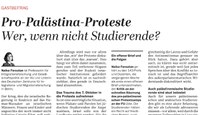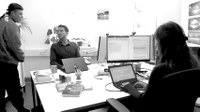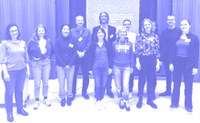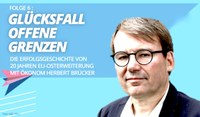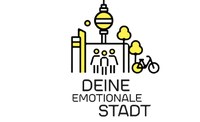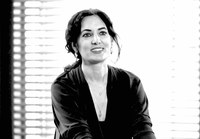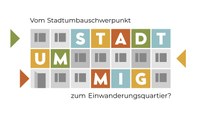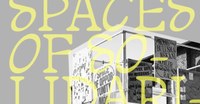Aktuelles
Prof. Brücker im Interview über Steuererleichterung für ausländische Fachkräfte
„Der Plan der Bundesregierung schafft neue Ungleichheiten und ist ineffizient“ – so Herbert Brücker im Interview mit dem „Spiegel“ über die geplanten Steuererleichterungen für ausländische Fachkräfte. / „The federal government's plan creates new inequalities and is inefficient" – this is what Herbert says in an interview with „Spiegel“ about the planned tax breaks for foreign skilled workers.
„Fußball, Deutschland, Postmigrantisch“ – Folge 2 des neuen Podcasts
Soeben ist #2 des empfehlenswerten Podcasts „Fußball, Deutschland, Postmigrantisch“ erschienen, diesmal zum Thema Racist Stacking. Mit Younis Kamil und Özgür Özvatan (BIM). / The #2 of the recommended podcast "Fußball, Deutschland, Postmigrantisch" has just been released, this time on the topic of Racist Stacking. Feat. Younis Kamil and Özgür Özvatan (BIM).
Gastbeitrag von Naika Foroutan im „Tagesspiegel“
In einem ausführlichen Gastbeitrag in der Ausgabe des „Tagesspiegel“ vom 15.5.2024 nimmt Prof. Naika Foroutan unter dem Titel „Wer, wenn nicht Studierende?“ zur Debatte um Pro-Palästina-Proteste Stellung. / Prof. Naika Foroutan comments on the debate surrounding pro-Palestine protests in a detailed guest article in the May 15, 2024 edition of the „Tagesspiegel“ entitled „Who, if not students?“.
Migration gegen den Arbeitskräftemangel
In einem sehenswerten aktuellen Kurzbeitrag auf ARTE über den Mangel an Arbeitskräften in Deutschland geht es um ein Job-Programm für Geflüchtete. Auch Dr. Özgür Özvatan (BIM) wird dazu befragt. / A remarkable current report on ARTE about the shortage of workers in Germany is about a job program for refugees. Dr. Özgür Özvatan (BIM) is also asked about this.
Nachhaltigkeit der Demonstrationen für Demokratie
Wie es um die Nachhaltigkeit der Demonstrationen für Demokratie vom Anfang des Jahres steht, untersuchen Daniel Kubiak und Mert Pekşen in einem Beitrag für die Istanbul Bilgi Üniversitesi. / Daniel Kubiak and Mert Pekşen examine the sustainability of the demonstrations for democracy at the beginning of the year in an article for Istanbul Bilgi Üniversitesi.
„There is nothing so practical as a good theory”
A 2-day workshop, supported by a SEAS Grant awarded to Dr. Tim Müller (BIM, Humboldt-University Berlin), took place at 18th and 19th April in Berlin. The international event, which welcomed junior as well as senior scholars and practitioners, brought together 17 participants from Europe and the US. / Am 18. und 19. April fand in Berlin ein zweitägiger Workshop unter Leitung von Dr. Tim Müller (BIM, Humboldt-Universität zu Berlin) statt, ermöglicht durch ein SEAS-Stipendium. An der internationalen Veranstaltung nahmen 17 Nachwuchswissenschaftler:innen und Expert:innen aus Europa und den USA teil.
Herbert Brücker über 20 Jahre EU-Osterweiterung
Der Gewinn für den Sozialstaat sei enorm und viel größer als die Probleme, sagt der Wirtschaftsforscher Herbert Brücker in einer neuen Folge des empfehlenswerten Podcasts des Mediendienst Integration zum Thema EU-Osterweiterung. / The benefits for the welfare state are enormous and much greater than the problems, says economic researcher Herbert Brücker in a new episode of the recommended podcast from Mediendienst Integration about the EU eastward expansion.
Citizen-Science-Projekt „Deine Emotionale Stadt“
„Deine Emotionale Stadt“ ist ein Citizen-Science-Projekt, bei dem Bürger*innen und Besucher*innen Berlins eine Woche lang ihre emotionalen Erfahrungen im Berliner Alltag teilen./ "Your Emotional City" is a citizen science project in which citizens and visitors to Berlin spend a week sharing their emotional experiences of everyday life in Berlin.
SZ-Bericht „AfD: Das Spiel mit den Gegensätzen“
„Politiker der AfD machen Stimmung gegen Zuwanderung und Geflüchtete. Gleichzeitig wirbt die Partei aber immer offensiver um Wählerinnen und Wähler mit Migrationshintergrund. Wie passt das zusammen?“ Die SZ beleuchtet den Hintergrund und befragt dazu auch Naika Foroutan. / „AfD politicians are stirring up a mood against immigration and refugees. At the same time, however, the party is becoming increasingly aggressive in attracting voters with a migration background. How does that fit together?“ The SZ sheds light on the background and also interviews Naika Foroutan.
Naika Foroutan in der „Zeit“ über migrantische Wähler:innen und deren ambivalentes Verhältnis zur AfD
In der Ausgabe der „Zeit“ vom 8. März 2024 erläutert Prof. Dr. Naika Foroutan, warum Menschen mit Einwanderungsgeschichte Gamechanger bei kommenden Wahlen werden könnten – und ausgerechnet von der AfD gezielt umworben werden. / In the issue of "Die Zeit" from March 8, 2024, Prof. Dr. Naika Foroutan explains why people with a history of immigration could become game changers in upcoming elections - and are being specifically courted by the AfD.
Haus der Solidarität – In Verteidigung der Migrationsgesellschaft
Dreitägige Veranstaltung am Hebbel am Ufer (HAU) in Berlin mit Diskussionen, Konzerten, Comedy, Spoken Word und Festen – ein Projekt von Transforming Solidarities (BIM) im Rahmen der Reihe „Claiming Common Spaces“. / Three-day event at Hebbel am Ufer (HAU) in Berlin with discussions, concerts, comedy, spoken word and parties - a project by Transforming Solidarities (BIM) as part of the "Claiming Common Spaces" series.
Foroutan bei Böhmermann
In der aktuellen Ausgabe des Magazin Royale mit Jan Böhmermann wird Maximilian Krah porträtiert, Spitzenkandidat der AfD für die Europawahl. Naika Foroutan ist mit einem Statement vertreten, demzufolge die AfD auch auf die Stimmen derer zielt, die sie zugleich bekämpft./ In the current edition of Magazin Royale with Jan Böhmermann, Maximilian Krah, the AfD's lead candidate for the European elections, is portrayed. Naika Foroutan is featured with a statement according to which the AfD is also targeting the votes of those it is fighting against.
Neues Working Paper zum Projekt „Bewohner*innenschaft und Migration“
Kürzlich ist das Working Paper 3 zum Teilprojekt „Bewohner*innenschaft und Migration“ im Rahmen von StadtumMig erschienen. / Working Paper 3 on the sub-project „Residents and Migration“ was recently published as part of StadtumMig.
Finissage: Ausstellung „Spaces Of Solidarity“
Am 21.1.24 findet die Finissage der Ausstellung „Spaces Of Solidarity“ im Deutschen Architekturzentrum statt. / On 21, January 2024, the finissage of the exhibition "Spaces Of Solidarity" will take place at Deutsches Architekturzentrum.
Faktencheck zum Thema Bürgergeld
Zu viel oder zu wenig Geld, angeblicher Anreiz für Migration und die Frage, wer es bekommt: Derzeit wird heftig über das Bürgergeld diskutiert. Grund ist die Erhöhung ab Januar 2024. Im Faktencheck des BR kommen u.a. Tim Müller und Herbert Brücker vom BIM zu Wort. / Too much or too little money, an alleged incentive for migration and the question of who gets it: the citizen's income is currently the subject of heated debate. The reason is the increase from January 2024. In the BR fact check, Tim Müller and Herbert Brücker of the BIM, among others, have their say.
Özgür Özvatan im Interview mit der Berliner Zeitung zum Thema „Debattieren über Nahost“
In einem aktuellen Interview mit der Berliner Zeitung zum Thema „Debattieren über Nahost“ sagt Özgür Özvatan, Sozialwissenschafter und Co-Abteilungsleiter des BIM: „Es ist möglich, Empathie zu zeigen, ohne Partei zu ergreifen.“ / In a current interview with the Berliner Zeitung on the topic "Debating the Middle East", Özgür Özvatan, social scientist and co-head of the BIM department Social Policy, says: "It is possible to show empathy without taking sides."



